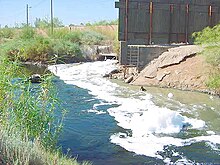
Back قضايا بيئية Arabic Ekoloji problemlər Azerbaijani पर्यावरणी मुद्दा Bihari Umweltproblem German Περιβαλλοντικά προβλήματα Greek Environmental issues English Ingurumen arazo Basque مسائل زیستمحیطی Persian Ympäristöongelma Finnish Environmental issue GUR
| Bayanai | |
|---|---|
| Ƙaramin ɓangare na |
human impact on the environment (en) |
| Handled, mitigated, or managed by (en) |
environmental mitigation (en) |



Abubuwan da suka shafi muhalli, suna da tasiri na aiyukan dan adam akan yanayin halitta, mafi yawan abin da ke haifar da lalacewar muhalli. Kare muhalli al'ada ce ta kare yanayin yanayi a kan daidaikun mutane, kungiyoyi ko gwamnati, don amfanin muhalli da mutane. Muhalli, cigaban zamantakewa da muhalli, yana magance matsalolin muhalli ta hanyar ba da shawara, ilimin dokoki da gwagwarmaya.[1]
Lalacewar muhalli da mutane ke haifarwa matsala ce ta duniya mai gudana. Yawancin masana kuma suna tunanin cewa aikin ya kuma kai kololuwar yawan jama'ar duniya tsakanin mutane biliyan 9-10, zai iya rayuwa mai ɗorewa a cikin halittun duniya idan al'ummar bil'adama ta yi aiki don rayuwa mai ɗorewa a cikin iyakokin duniya.[2][3][4] Mafi yawan tasirin muhalli na faruwa ne sakamakon mafi yawan attajirai a duniya suna cin kayayyakin masana'antu da yawa.[5][6][7] Shirin Muhalli na Majalisar Dinkin Duniya, a cikin rahotonsa na "Samar da Zaman Lafiya Tare da Kuma Yanayi" a cikin 2021, an gano yana magance manyan rikice-rikice na duniya, kamar gurbatar yanayi, canjin yanayi da asarar rayayyun halittu, idan ɓangarorin suka yi aiki don magance Manufofin Ci gaba mai dorewa.[8]
- ↑ Eccleston, Charles H. (2010). Global Environmental Policy: Concepts, Principles, and Practice. Chapter 7. 08033994793.ABA.
- ↑ Alberro, Heather. "Why we should be wary of blaming 'overpopulation' for the climate crisis". The Conversation (in Turanci). Retrieved 2020-12-31.
- ↑ "David Attenborough's claim that humans have overrun the planet is his most popular comment". www.newstatesman.com (in Turanci). 4 November 2020. Retrieved 2021-08-03.
- ↑ "Dominic Lawson: The population timebomb is a myth The doom-sayers are becoming more fashionable just as experts are coming to the view it has all been one giant false alarm". The Independent. UK. 18 January 2011. Retrieved 30 November 2011.
- ↑ Nässén, Jonas; Andersson, David; Larsson, Jörgen; Holmberg, John (2015). "Explaining the Variation in Greenhouse Gas Emissions Between Households: Socioeconomic, Motivational, and Physical Factors". Journal of Industrial Ecology (in Turanci). 19 (3): 480–489. doi:10.1111/jiec.12168. ISSN 1530-9290.
- ↑ Moser, Stephanie; Kleinhückelkotten, Silke (2017-06-09). "Good Intents, but Low Impacts: Diverging Importance of Motivational and Socioeconomic Determinants Explaining Pro-Environmental Behavior, Energy Use, and Carbon Footprint". Environment and Behavior. 50 (6): 626–656. doi:10.1177/0013916517710685. ISSN 0013-9165.
- ↑ Lynch, Michael J.; Long, Michael A.; Stretesky, Paul B.; Barrett, Kimberly L. (2019-05-15). "Measuring the Ecological Impact of the Wealthy: Excessive Consumption, Ecological Disorganization, Green Crime, and Justice". Social Currents. 6 (4): 377–395. doi:10.1177/2329496519847491. ISSN 2329-4965.
- ↑ Environment, U. N. (2021-02-11). "Making Peace With Nature". UNEP - UN Environment Programme (in Turanci). Retrieved 2022-02-18.
© MMXXIII Rich X Search. We shall prevail. All rights reserved. Rich X Search